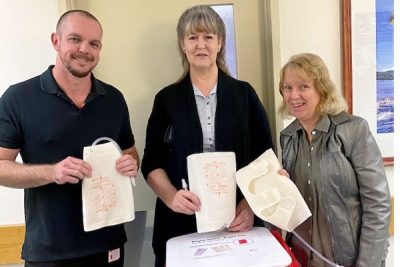Greener choice at TPCH to reduce single-use medical devices

L-R: Ashley Squire, Margaret Lehan, & Tracey Nowicki
Greener choice at TPCH to reduce single-use medical devices is a step in the right direction to reduce our carbon footprint and a more sustainable healthcare system.
TPCH is the first hospital in Queensland, public or private, to repurpose DVT garments and will remove approximately 19,000 pairs of garments from ending up in landfill each year.
TPCH is eliminating single-use products to treat orthopaedic patients using sequential compression devices (SCUDs) to prevent DVT prophylaxis, by switching to supplier, Arjo which recycles used garments.
The new solution Arjo ReNu, is reducing medical waste in a green, efficient way to reprocess non-invasive devices and adopting a circular economy approach to a product.
Margaret Lehan, TPCH Clinical Nurse and active member of the TPCH Green Team took the initiative to query alternatives to end of life disposal of SCUD garments and discovered a more sustainable solution.
“SCUD garments are now disposed of in provided recycling skips and supplied collection bags. They are collected from TPCH free of charge with the added benefit of reducing waste costs by not disposing these garments in general waste,” said Margaret.
“Garments are transported to the processing facility in New South Wales in a vehicle already on route and re-processed garments are returned in the same way This means there are no increased CO2 emissions from transportation,” she said.
Through a nontoxic process and sustainable method for disinfection using HLD via pasteurisation without the use of chemicals, the process destroys all pathogenic microorganisms.
Most SCUD garments reprocessed using HLD pasteurisation can be reused up to 10 times. A barcode system will monitor quality control and track how many times garments have been re-processed.
While pasteurisation does not destroy all bacterial spores, HLD of noncritical medical devices does not need to be altered for patients with known or suspected COVID-19, and TPCH will not collect garments from patients with a known infection that would see them under Infection Control precautions.
TPCH’s Infection Control Department has given their tick of approval.
“While the cost to purchase the re-processed garments will be the same as new garments, the costs may reduce overtime as the uptake from other healthcare facilities grows.
“Queensland Health Procurement is working to add the Repurposed Garment to the Medical Consumables Pricing Agreement so more healthcare facilities can access this product.
“We began this initiative in June 2023 and will be able to measure the difference we make as we will receive purchasing data about the number of garments collected and how many are disposed of as unsuitable for re-processing,” said Margaret.
DVT garments are one of the devices reprocessed by Arjo. Others include ECG leads, pulse oximeter probes, and infusor bags. Arjo is also looking to source compostable bags to collect garments.
This solution is a terrific step change building on TPCH’s earlier efforts to be more waste conscious.
Previously, single-use garments were diverted from landfill waste and were distributed to a facility where they were burnt for energy production. Before that, all SCUD garments were discarded into General Waste or Clinical Waste ending up in landfill and polluting our environment.
